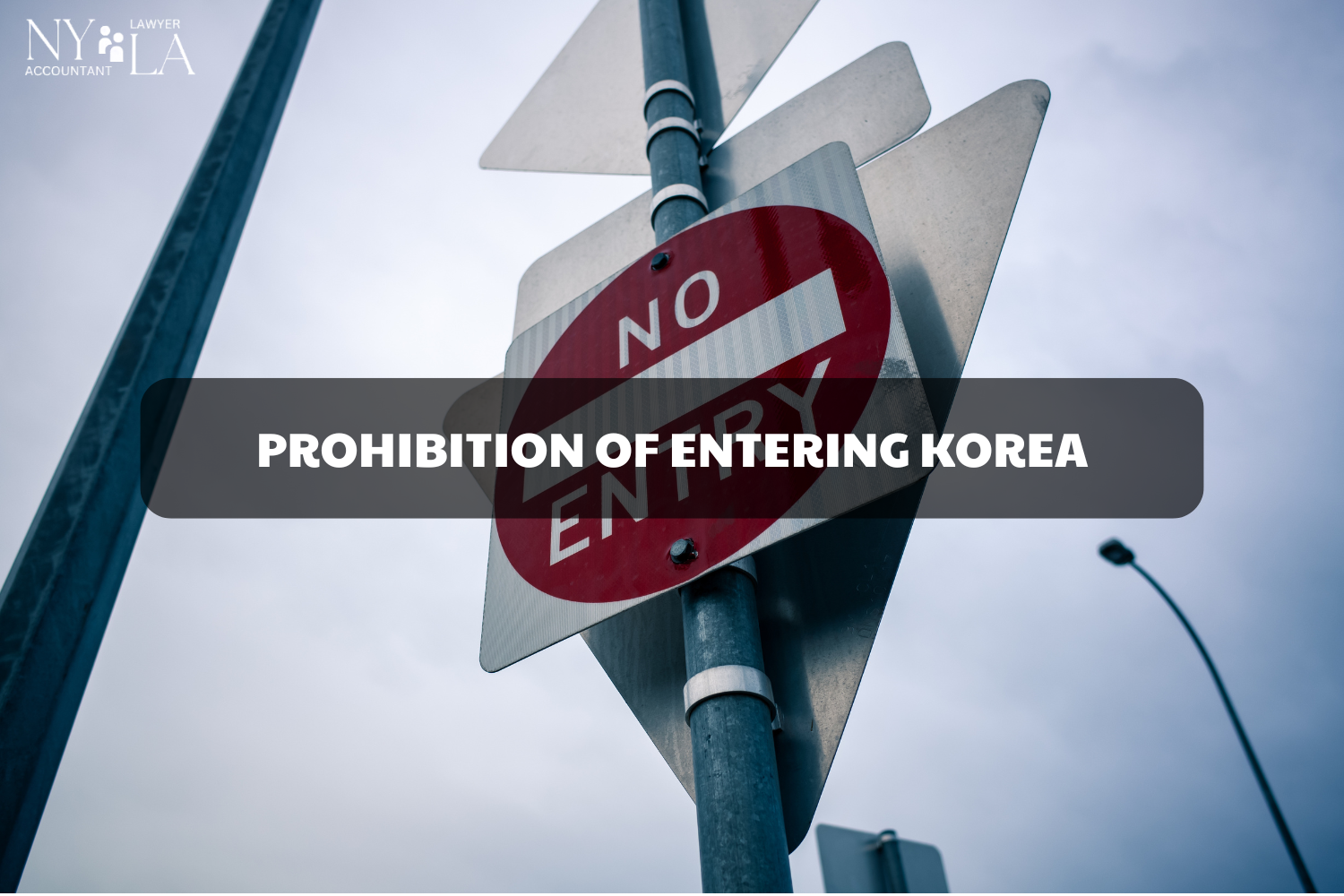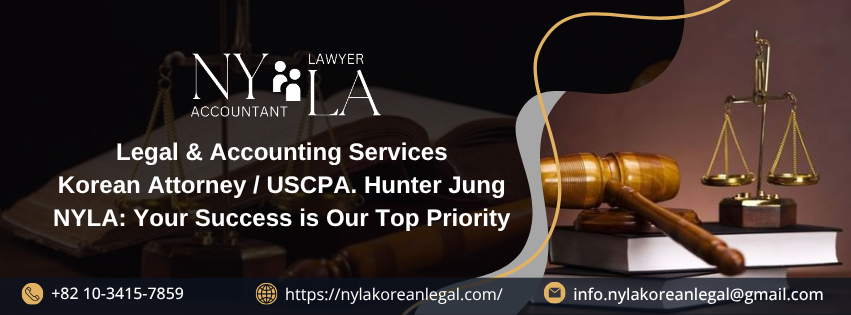Legal basis:
– Immigration Act.
The Prohibition of Entering Korea is a critical aspect of the nation’s immigration regulations, with the objective of ensuring that foreign individuals who may pose a threat to public health, security, or social order are restricted from entering the country. The Immigration Act serves as the legal foundation for these restrictions, giving the Minister of Justice the authority to deny entry to certain individuals under specified circumstances.

Summary
- 1. Health and Safety Concerns: Protection from Public Health Risks
- 2. Unlawful Entry with Dangerous Items: Safeguarding National Security
- 3. Individuals Likely to Harm National Interests or Public Safety
- 4. Threats to Economic and Social Order: Maintaining Stability
- 5. Vulnerable Individuals: Protection of Mental and Financial Well-Being
- 6. Deportation and Re-entry Restrictions: Five-Year Waiting Period
- 7. Historical Accountability: Restrictions on Individuals with a History of Atrocities
- 8. Discretion of the Minister of Justice: Additional Restrictions
- 9. Reciprocal Measures: International Relations and Entry Refusals
- 10. About NYLA – Korean Legal Office
1. Health and Safety Concerns: Protection from Public Health Risks
One of the primary reasons for the Prohibition of Entering Korea is to safeguard public health. Under this regulation, individuals who are contagious patients, narcotics addicts, or otherwise deemed a threat to public health are not allowed to enter the country. This measure ensures that the spread of diseases or other harmful conditions is prevented, maintaining the health and safety of the Korean population.
2. Unlawful Entry with Dangerous Items: Safeguarding National Security
The Prohibition of Entering Korea also applies to individuals who attempt to enter the country with dangerous weapons or explosives, such as firearms, guns, swords, and explosives. Such actions pose a direct threat to national security and public safety. The law serves as a preventive measure to protect Korea from the entry of individuals who might intend to use these items for illegal purposes.
3. Individuals Likely to Harm National Interests or Public Safety
The Prohibition of Entering Korea extends to those individuals who are deemed likely to engage in activities that could harm the interests of the Republic of Korea or compromise public safety. This could include a wide range of potential threats, from espionage to terrorism. If there is a reasonable suspicion that an individual may engage in such harmful actions, the Minister of Justice has the authority to refuse entry.
4. Threats to Economic and Social Order: Maintaining Stability
In addition to public safety, the Prohibition of Entering Korea also aims to protect the economic and social order of the country. Foreign nationals who are likely to engage in activities detrimental to Korea’s economic stability or its social fabric can be barred from entry. This provision underscores the importance of maintaining good morals and a stable, functional society.
5. Vulnerable Individuals: Protection of Mental and Financial Well-Being
The law also considers the protection of vulnerable individuals. If a foreign national suffers from a mental disability that impairs their ability to make informed decisions and lacks a support system to assist with their stay in Korea, entry may be denied. Similarly, individuals who cannot afford the financial costs associated with staying in Korea may also be prohibited from entering. This provision ensures that individuals who may be at risk are not allowed to enter and potentially become a burden on the Korean healthcare or social welfare systems.
6. Deportation and Re-entry Restrictions: Five-Year Waiting Period
Another key aspect of the Prohibition of Entering Korea relates to individuals who have been deported from Korea. If a foreign national has been deported from the country, they are prohibited from re-entering for a period of five years. This restriction is in place to ensure that individuals who have violated the country’s laws or immigration rules do not return to cause further issues.
7. Historical Accountability: Restrictions on Individuals with a History of Atrocities
The Prohibition of Entering Korea also addresses individuals who were involved in historical atrocities, particularly during the period from August 29, 1910, to August 15, 1945. This includes those who took part in the slaughter or cruel treatment of people based on race, ethnicity, religion, nationality, or political opinion. The law specifically targets those who acted under the influence or direction of the Japanese government, or any government allied with Japan, during this period.
8. Discretion of the Minister of Justice: Additional Restrictions
Finally, the Prohibition of Entering Korea gives the Minister of Justice the discretion to deny entry to any individual who, for reasons not specifically listed above, is deemed inappropriate for entry into the country. This allows the Ministry to respond flexibly to emerging threats or concerns that may not have been foreseen in the legislation.
9. Reciprocal Measures: International Relations and Entry Refusals
In addition to the above restrictions, the Prohibition of Entering Korea includes a provision related to international relations. If a foreign national’s home country refuses entry to a South Korean national for reasons other than those outlined above, the Minister of Justice may similarly refuse entry to that foreign national on the grounds of reciprocity. This ensures that South Korea’s diplomatic relations and national interests are upheld in the international arena.
Conclusion
The Prohibition of Entering Korea is a crucial part of South Korea’s immigration policy, designed to protect public health, national security, social order, and economic stability. By outlining clear criteria for who may or may not be allowed to enter the country, the law ensures that only individuals who meet certain health, safety, and ethical standards are permitted entry. The discretion granted to the Minister of Justice allows for flexibility in responding to specific threats, ensuring that Korea remains a safe and secure place for its citizens and visitors alike.
10. About NYLA – Korean Legal Office

■ NYLA – Your Trusted Legal Partner in Korea
At NYLA, we understand that the success of foreign businesses in Korea requires not only a solid business strategy but also reliable legal support. With a team of experienced Korean attorneys and legal professionals, NYLA provides tailored legal services for companies, investors, and individuals operating or planning to establish a presence in Korea.
We support our clients throughout the entire business journey with comprehensive services, including:
- Legal consultation on company establishment, taxation, and immigration;
- Advice on commercial real estate, franchising, and product distribution;
- Support in human resources, marketing, and business strategy.
In addition to legal advisory, NYLA also represents clients in civil litigation cases related to business, labor, marriage, family, and inheritance to ensure their rights and interests are fully protected.
■ Contact NYLA

If you’re a foreign business or individual looking for a reliable legal partner in Korea, NYLA is here to help. We are committed to delivering effective, practical, and personalized legal solutions for every client.
With a proven track record of assisting hundreds of international clients, our team is equipped to help you navigate complex legal challenges—whether it’s commercial disputes, contract issues, or foreign investment guidance.
Don’t let legal matters hold you back. Let NYLA be your trusted guide in the Korean market.
■ Get in touch with NYLA for expert legal support
| Website: https://nylakoreanlegal.com/
FB: https://www.facebook.com/nyla.koreanlegal Tiktok: https://www.tiktok.com/@nylakoreanlegal Youtube: https://www.youtube.com/@NYLA-xd8qx Email: info.NYLAkoreanlegal@gmail.com SĐT: +82 10-3415-7859 |
 |






















































